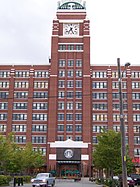
The 2007 total gross state product for Washington was $311.5 billion, placing it 14th in the nation.[27] The per capita personal income in 2007 was $41,203, 10th in the nation. Significant business within the state include the design and manufacture of jet aircraft (Boeing), computer software development (Microsoft, Amazon.com, Nintendo of America, Valve Corporation), electronics, biotechnology, aluminum production, lumber and wood products (Weyerhaeuser), mining, and tourism. The state has significant amounts of hydroelectric power generation.
Significant amounts of trade with Asia pass through the ports of the Puget Sound. See list of United States companies by state. Fortune magazine survey of the top 20 Most Admired Companies in the US has 4 Washington based companies in it, Starbucks, Microsoft, Costco and Nordstrom.[28]
The state of Washington has the least progressive tax structure in the U.S.[clarification needed] It is one of only seven states that does not levy a personal income tax. The state also does not collect a corporate income tax or franchise tax. However, Washington businesses are responsible for various other state levies. One tax Washington charges on most businesses is the business and occupation tax (B & O), a gross receipts tax which charges varying rates for different types of businesses.

Washington's state sales tax is 6.5 percent, and it applies to services as well as products.[29] Most foods are exempt from sales tax; however, prepared foods, dietary supplements and soft drinks remain taxable. The combined state and local retail sales tax rates increase the taxes paid by consumers, depending on the variable local sales tax rates, generally between 8 and 9 percent.[30] An excise tax applies to certain select products such as gasoline, cigarettes, and alcoholic beverages. Property tax was the first tax levied in the state of Washington and its collection accounts for about 30 percent of Washington's total state and local revenue. It continues to be the most important revenue source for public schools, fire protection, libraries, parks and recreation, and other special purpose districts.
All real property and personal property is subject to tax unless specifically exempted by law. Personal property also is taxed, although most personal property owned by individuals is exempt. Personal property tax applies to personal property used when conducting business or to other personal property not exempt by law. All property taxes are paid to the county treasurer's office where the property is located. Washington does not impose a tax on intangible assets such as bank accounts, stocks or bonds. Neither does the state assess any tax on retirement income earned and received from another state. Washington does not collect inheritance taxes; however, the estate tax is decoupled from the federal estate tax laws, and therefore the state imposes its own estate tax.
Washington is one of eighteen states which has a government monopoly on sales of alcoholic beverages, although beer and wine with less than 20 percent alcohol by volume can be purchased in convenience stores and supermarkets. Liqueurs (even if under 20 percent alcohol by volume) and spirits can only be purchased in state-run or privately-owned-state-contracted liquor stores.[31]
Among its resident billionaires, Washington boasts Bill Gates, chairman of Microsoft, who, with a net worth of $40 billion, was ranked the wealthiest man in the world as of February 2009, according to Forbes magazine.[32] Other Washington state billionaires include Paul Allen (Microsoft), Steve Ballmer (Microsoft), Jeff Bezos (Amazon), Craig McCaw (McCaw Cellular Communications), James Jannard (Oakley), Howard Schultz (Starbucks), and Charles Simonyi (Microsoft).[33]
Agriculture

Washington is a leading agricultural state. (The following figures are from the Washington State Office of Financial Management and the USDA, National Agricultural Statistics Service, Washington Field Office.) For 2003, the total value of Washington's agricultural products was $5.79 billion, the 11th highest in the country. The total value of its crops was $3.8 billion, the 7th highest. The total value of its livestock and specialty products was $1.5 billion, the 26th highest.
In 2004, Washington ranked first in the nation in production of red raspberries (90.0% of total U.S. production), wrinkled seed peas (80.6%), hops (75.0%), spearmint oil (73.6%), apples (58.1%), sweet cherries (47.3%), pears (42.6%), peppermint oil (40.3%), Concord grapes (39.3%), carrots for processing (36.8%), and Niagara grapes (31.6%). Washington also ranked second in the nation in production of lentils, fall potatoes, dry edible peas, apricots, grapes (all varieties taken together), asparagus (over a third of the nation's production), sweet corn for processing, and green peas for processing; third in tart cherries, prunes and plums, and dry summer onions; fourth in barley and trout; and fifth in wheat, cranberries, and strawberries.
The apple industry is of particular importance to Washington. Because of the favorable climate of dry, warm summers and cold winters of central Washington, the state has led the U.S. in apple production since the 1920s.[34] Two areas account for the vast majority of the state's apple crop: the Wenatchee–Okanogan region (comprising Chelan, Okanogan, Douglas, and Grant counties), and the Yakima region (Yakima, Benton and Kittitas counties)

